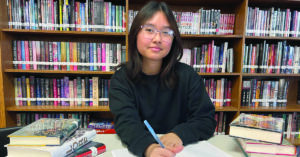From Dallas ISD Staff Reports
Spelled K-A-R-E-N, pronounced Kah·Ren, and not to be confused with Korean, Gay H. found herself explaining her cultural identity as a Karen person at length while growing up.

Photo courtesy of Dallas ISD
In a world that once made her feel disconnected from her ethnicity, Gay reflects on her journey of self-discovery in honor of Asian American Pacific Islander Heritage Month.
“To me, AAPI month means recognizing Asian heritage, and also traditions, because there are so many unique cultures and small ethnic groups in Asia. I’m lucky to live this life in America, but also to be Karen.”
Born and raised in Dallas, both of her parents came to the U.S. in 2006 from Thailand. Karen people often come from Myanmar, formerly known as Burma, and later migrated to the Burma-Thailand border.
“Being recognized for my culture until now is big for me, and a big change for society. I always felt like an outcast because I didn’t see representation of Asians growing up,” Gay said. “I was never confident about being Karen, or Asian at all. I feel like the way I live my life now shapes my identity as a Karen.”
Gay currently attends New Tech High School at B.F. Darrell where she is a junior in the AVID program and part of the debate team. As someone who prefers small environments, joining debate helped her adjust to being in a big school.
“I’m very quiet but when it comes to discussion about society, or social issues, I can talk a lot,” she said. “I like to keep myself organized and have good leadership skills.”
At home, connecting with her culture as a Karen, she cherished moments spent learning to cook traditional meals with her mother and taking trips to the store, all while conversing in their native language. She also discovered a passion for writing through weekend visits to the library with her mom.
“English is very unique. You can write about anything in any way you want. It helps me keep my mind off things and I like being able to express myself through writing,” Gay said.
In the future, Gay hopes to support Karen people and other lesser-known Asian ethnic groups as a bilingual traveling nurse in places like Indiana or Minnesota, where many of them often immigrate. “I really just want to help people, it doesn’t matter how much I get paid. As long as I’m helping someone, making their day. I just want to make people smile.”
